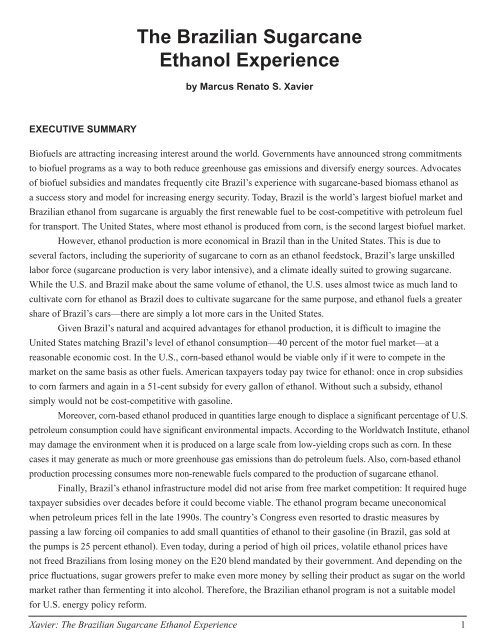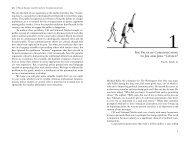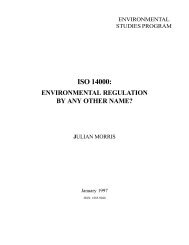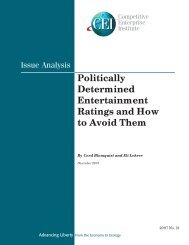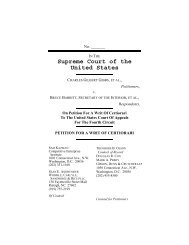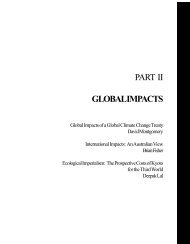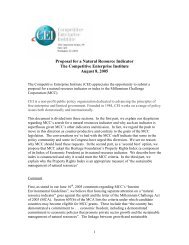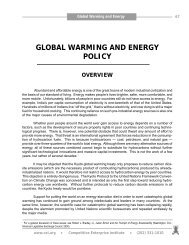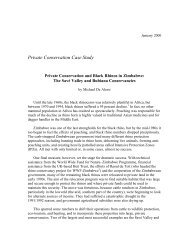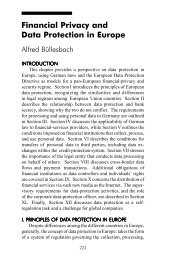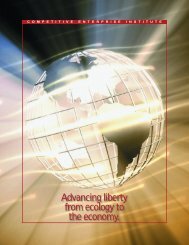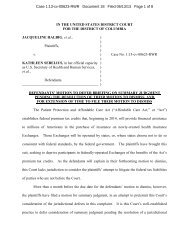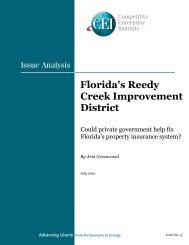The Brazilian Sugarcane Ethanol Experience - AgManager
The Brazilian Sugarcane Ethanol Experience - AgManager
The Brazilian Sugarcane Ethanol Experience - AgManager
Create successful ePaper yourself
Turn your PDF publications into a flip-book with our unique Google optimized e-Paper software.
EXECUTIVE SUMMARY<br />
Xavier: <strong>The</strong> <strong>Brazilian</strong> <strong>Sugarcane</strong> <strong>Ethanol</strong> <strong>Experience</strong><br />
<strong>The</strong> <strong>Brazilian</strong> <strong>Sugarcane</strong><br />
<strong>Ethanol</strong> <strong>Experience</strong><br />
by Marcus Renato S. Xavier<br />
Biofuels are attracting increasing interest around the world. Governments have announced strong commitments<br />
to biofuel programs as a way to both reduce greenhouse gas emissions and diversify energy sources. Advocates<br />
of biofuel subsidies and mandates frequently cite Brazil’s experience with sugarcane-based biomass ethanol as<br />
a success story and model for increasing energy security. Today, Brazil is the world’s largest biofuel market and<br />
<strong>Brazilian</strong> ethanol from sugarcane is arguably the fi rst renewable fuel to be cost-competitive with petroleum fuel<br />
for transport. <strong>The</strong> United States, where most ethanol is produced from corn, is the second largest biofuel market.<br />
However, ethanol production is more economical in Brazil than in the United States. This is due to<br />
several factors, including the superiority of sugarcane to corn as an ethanol feedstock, Brazil’s large unskilled<br />
labor force (sugarcane production is very labor intensive), and a climate ideally suited to growing sugarcane.<br />
While the U.S. and Brazil make about the same volume of ethanol, the U.S. uses almost twice as much land to<br />
cultivate corn for ethanol as Brazil does to cultivate sugarcane for the same purpose, and ethanol fuels a greater<br />
share of Brazil’s cars—there are simply a lot more cars in the United States.<br />
Given Brazil’s natural and acquired advantages for ethanol production, it is diffi cult to imagine the<br />
United States matching Brazil’s level of ethanol consumption—40 percent of the motor fuel market—at a<br />
reasonable economic cost. In the U.S., corn-based ethanol would be viable only if it were to compete in the<br />
market on the same basis as other fuels. American taxpayers today pay twice for ethanol: once in crop subsidies<br />
to corn farmers and again in a 51-cent subsidy for every gallon of ethanol. Without such a subsidy, ethanol<br />
simply would not be cost-competitive with gasoline.<br />
Moreover, corn-based ethanol produced in quantities large enough to displace a signifi cant percentage of U.S.<br />
petroleum consumption could have signifi cant environmental impacts. According to the Worldwatch Institute, ethanol<br />
may damage the environment when it is produced on a large scale from low-yielding crops such as corn. In these<br />
cases it may generate as much or more greenhouse gas emissions than do petroleum fuels. Also, corn-based ethanol<br />
production processing consumes more non-renewable fuels compared to the production of sugarcane ethanol.<br />
Finally, Brazil’s ethanol infrastructure model did not arise from free market competition: It required huge<br />
taxpayer subsidies over decades before it could become viable. <strong>The</strong> ethanol program became uneconomical<br />
when petroleum prices fell in the late 1990s. <strong>The</strong> country’s Congress even resorted to drastic measures by<br />
passing a law forcing oil companies to add small quantities of ethanol to their gasoline (in Brazil, gas sold at<br />
the pumps is 25 percent ethanol). Even today, during a period of high oil prices, volatile ethanol prices have<br />
not freed <strong>Brazilian</strong>s from losing money on the E20 blend mandated by their government. And depending on the<br />
price fl uctuations, sugar growers prefer to make even more money by selling their product as sugar on the world<br />
market rather than fermenting it into alcohol. <strong>The</strong>refore, the <strong>Brazilian</strong> ethanol program is not a suitable model<br />
for U.S. energy policy reform.<br />
1


